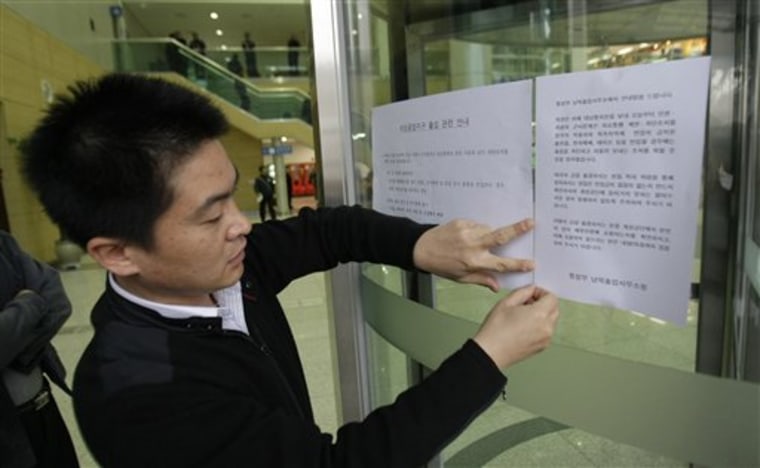North Korea began restricting traffic through its border with South Korea on Monday — punishment for Seoul's hard-line stance toward the communist regime.
North Korea ordered a sharp cut in the number of South Koreans permitted to stay in a joint industrial complex in its border city of Kaesong, allowing only 880 South Koreans — a fifth of the 4,200 with permits for the enclave, and about half the number there on an average workday, Seoul's Unification Ministry said.
The drastic cutback is one of a series of measures the communist nation is taking in anger over Seoul's hard-line stance toward Pyongyang.
The order is expected to affect 88 South Korean companies that run factories in Kaesong using North Korean labor. About 1,600-1,700 South Koreans typically work in the complex on an average day, managing 35,000 North Koreans employed at the factories.
"Of course it's a nuisance. We could leave the complex at our convenience, and now that they're restricting our entry, I foresee some difficulties arising," Ahn Young-su, 51, a South Korean manager in Kaesong, said at a border checkpoint.
Starting Monday, Pyongyang also suspended tours to the ancient border city near the complex as well as a cross-border train service. A third major reconciliation project, a tour to the North's scenic Diamond Mountain, has been suspended since a North Korean soldier fatally shot a South Korean tourist there in July.
"It is very regrettable that North Korea has imposed restrictions on border crossings," Unification Ministry spokesman Kim Ho-nyeon said. "The North's measure should be immediately withdrawn."
Tensions high
The staff reduction is expected to inconvenience South Korean firms in Kaesong, the spokesman said. He repeated Seoul's long-running call on Pyongyang to agree to dialogue.
Tensions have been high since conservative South Korean President Lee Myung-bak took office in February with a pledge to seek a tougher approach to Pyongyang than his liberal predecessors.
Lee has questioned implementing key accords his predecessors struck with the North's Kim Jong Il that call for providing aid to the North without condition. That and other moves by Seoul, including its recent sponsorship of a U.N. resolution denouncing Pyongyang's human rights record, have enraged the North.
Pyongyang accuses Lee of seeking confrontation with the North, branding him a "traitor," "a pro-American sycophant" and "despicable human scum."
The 1950-53 Korean War ended in a truce, not a peace treaty, leaving the two Koreas technically at war. Ties warmed significantly following the first-ever summit of their leaders in 2000, but chilled again this year with Lee's election.
On Monday, North Korea's main Rodong Sinmun newspaper blamed the South for the tension.
"The step taken by the (North) is very just as it is an expression of the resolute principled stand and will of the (North) not to pardon the group of traitors' criminal acts," the paper said in commentary carried by Pyongyang's official Korean Central News Agency.
"The fate of the inter-Korean relations entirely depends on the attitude of the authorities of the South side," it said.
